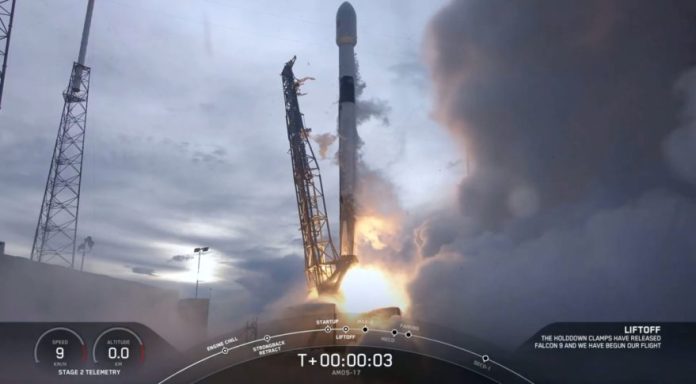TAMPA, Fla. — Israeli fleet operator Spacecom has secured an extension to use AsiaSat-8 until 2024, filling a coverage gap left by the loss of its Amos-6 satellite in 2016.
The company agreed to lease Hong Kong-based AsiaSat’s satellite, which it calls Amos-7, for an extra two years for an annual fee of $14 million.
That cost is down from $22 million annually under the original deal hatched in 2016, when Spacecom said it would use the satellite’s Ku-band capacity for at least four years.
Spacecom struck the leasing agreement months after its Amos-6 satellite was destroyed in September 2016, after a SpaceX Falcon 9 rocket preparing to launch it exploded during a fueling test.
As part of their deal, AsiaSat moved the spacecraft it had launched in 2014 from 105.5 degrees east — where it had covered China and nearby countries — to 4 degrees west to cover Africa, Europe and the Middle East alongside Spacecom’s Amos-3 satellite.
Asked for a reason for the annual fee difference, a Spacecom spokesperson said it “had more time to check our options and alternatives therefore the negotiation results were different.”
Spacecom owns the other three satellites in its fleet. The newest, Amos-17, covers sub-Saharan Africa, Europe, the Middle East and parts of Asia following a successful SpaceX launch in 2019.
The company had ordered a satellite called Amos-8 from Maxar Technologies in 2018 to replace Amos-6, but canceled the contract after Israel’s government said it would be built domestically instead.
As part of the Amos-6 extension announcement July 12, Spacecom said the owner of Israeli satellite TV broadcaster Yes DTH agreed to buy capacity from Amos-7 and Amos-3 for another two years in a $14 million deal.
The agreement increases Yes DTH’s order backlog to $100 million, according to Spacecom, and includes extension options that could bring in an additional $7 million of revenue for the operator.
Spacecom said it also recently secured a $38 million extension of a services contract from Israel’s government and a $6 million contract from a mobile operator in Africa.
On July 5, the Israeli company announced a deal worth at least $8.6 million to provide satellite broadcast capacity to Magyar Telekom, the Hungarian mobile operator, from 4 degrees west until the end of 2024.
Eastern Europe is an increasingly important market for the company. Hungary is home to 4iG, the IT and communications company aiming to buy 51% of Spacecom to accelerate its international space ambitions.
4iG announced its second international acquisition July 9 with plans to buy Nordic telco Telenor’s mobile operator in Montenegro, in Southeastern Europe.
Telenor Montenegro had 338,000 subscribers and generated 43 million euros ($51 million) in revenue in 2020, according to 4iG.
“We see significant growth potential in the Western Balkans region, and we expect that over the next five years, the region’s economic growth could be boosted significantly by the enlargement of the European Union,” 4iG CEO and chair Gellért Jászai said in a statement.
“We therefore intend to further increase our presence in the region, in addition to the acquisition we have just announced. To this end, we are continuously exploring investment opportunities in the telecoms and IT sectors.”
Africa is also an increasingly strategic market for Spacecom, which said June 29 it will buy 9.3% of rural connectivity provider Nuran Wireless to strengthen its presence across the continent.
– Advertisement –
